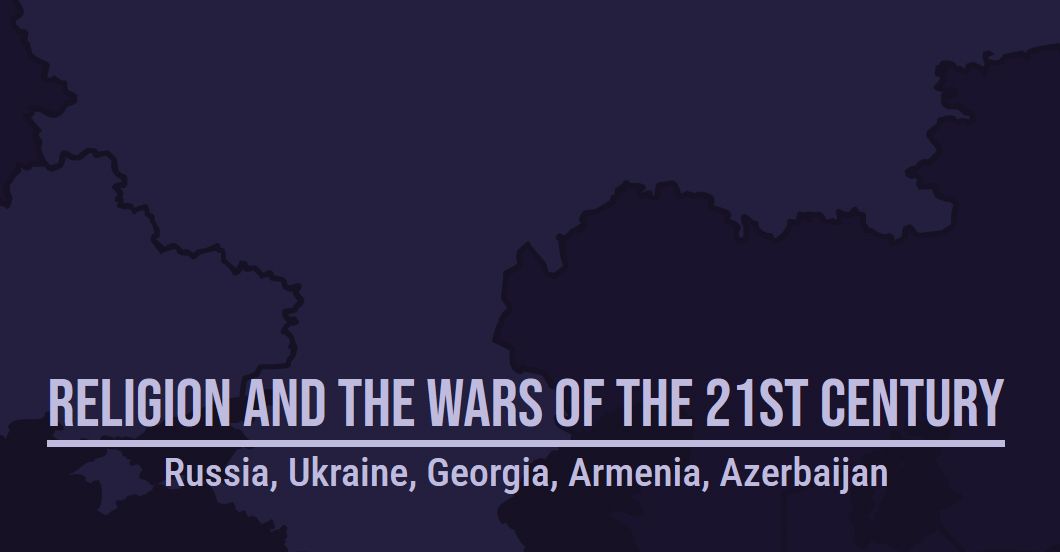Datenbank: Religion and the Wars of the 21. Century

Welcome to Rewars21, a data repository dedicated to understanding the relationship between religion and recent military conflicts in Georgia, Ukraine and Karabakh. The project explores the ways in which religious ideologies and leaders have intersected with these conflicts. Enhanced with an interactive timeline, the platform visually unfolds the evolution of religious narratives around war and peace, justification strategies, and the role of religious figures across various themes, including theological perspectives, cultural memory, peace initiatives, military dynamics, and interfaith relations, among others. This repository is a collaboration between Indigo and the Center for Governance and Culture in Europe at the University of St.Gallen (GCE-HSG) that aims to promote a deeper understanding of these conflicts and the significant impact of religion on geopolitics.
About the Project
The website presents an in-depth examination of how religious ideologies, institutions, and leaders have been involved in shaping contemporary conflicts in Georgia, Ukraine and Nagorno-Karabakh. The data repository explores when and how religion acts as a double-edged sword in the geopolitical landscape, both fueling tensions and fostering avenues for peace. By highlighting specific religious ideologies - such as the influence of Orthodox Christianity in the Russian invasion of Ukraine, an interplay between Armenian Apostolic Christianity and Azerbaijani Islam in the Nagorno-Karabakh conflict - the data repository sheds light on the complex relationships between faith, identity, and territorial disputes. Through a wealth of data and interactive maps, users are offered an unparalleled look at the religious dynamics underpinning some of today's most intractable regional conflicts.
Scope
The project meticulously examines various stages of conflict, from those overtly justified by religious rhetoric to those in which religious identity subtly underpins political and territorial tensions. Our research extends to the various levels of religious influence, including the rhetoric used by religious institutions, the formal and informal religious narratives that inform public discourse on military conflict. Moreover, the scope of the repository covers both interreligious conflict (between different religious groups) and intrareligious conflict (within a single religious denomination). The repository includes original texts on the representation of particular religious-political narratives in the media (including digital media), the dissemination of particular religious narratives, the role of religion in peacebuilding initiatives, including interfaith dialogue, religious diplomacy, and grassroots reconciliation efforts.
Methodology and Coding Strategies
The project's analytical strategy centered on content analysis, a methodological approach that allowed for the systematic examination of communication and narrative in our selected primary and secondary sources. These sources were carefully chosen by project’s local experts from the public domain and spanned multiple languages (e.g. Armenian, Azerbaijani, Turkish, Russian, Georgian, and Ukrainian). This multilingual approach ensured that our analysis was both comprehensive and culturally sensitive, allowing us to capture the diverse perspectives and contextual nuances of religious engagement with conflict in different regions.
The rationale for using content analysis lay in its ability to qualitatively analyze textual data, allowing us to identify patterns, themes, and frequencies of specific religious rhetoric and narratives. This method was particularly suited to the goals of our project because it allowed for a detailed examination of how religious ideologies and identities are constructed and mobilized in the public sphere, allowing the broader scholarly community to formulate new hypotheses about conflict dynamics and peacebuilding efforts, as well as the agency of religious institutions in global affairs.
Data Selection
A rigorous selection process was applied to primary and secondary sources, prioritizing relevance, authorship authority, peer review, and a range of perspectives to ensure a rich, multidimensional analysis. Recognizing the importance of linguistic diversity, our multilingual team of experts meticulously collected materials in languages relevant to the regions studied, overcoming potential linguistic barriers and ensuring a diverse collection of narratives. The content analysis methodology was carefully designed to account for the socio-political and historical contexts of the data, recognizing the importance of these factors for religious narratives.
To mitigate the biases inherent in secondary sources, a critical engagement approach was adopted that included cross-referencing and assessing the credibility of sources, as well as ensuring a broad representation of viewpoints. The challenge of translating and interpreting content in multiple languages was addressed through the expertise of specialized translators and regional experts, who ensured that religious terminology and concepts were accurately conveyed in excerpts that summarized the key arguments of the original texts or video material.
Our analytical framework skillfully accommodated both qualitative depth and the use of content analysis techniques to identify thematic patterns. This approach allowed for the synthesis of findings from a variety of sources into a coherent narrative about the relationship between religion and conflict. Validation of these findings was achieved through internal peer review, expert consultation, and cross-verification methods, ensuring the reliability and validity of the data collected.
In addition, the project paid careful attention to the temporal dynamics of conflict, incorporating sources from different time periods to track the evolution of religious engagement in conflict over time. Ethical considerations were paramount, with measures taken to anonymize sensitive information, critically evaluate sources for ethical content production, and ensure respectful representation of all parties involved, thereby upholding the highest standards of research integrity in exploring the sensitive nexus between religion and conflict, in full compliance with the ethical regulations of the countries in which this data was collected.
Team
Led by Dr. Tornike Metreveli, the team responsible for data collection and analysis for the project includes experts from various fields: sociologists, theologians, anthropologists and journalists. This interdisciplinary group includes Professor Archimandrite Cyril Hovorun, Dr. Victoria Vorobieva (pseudonym), Denys Pikus, Dr. Nelly Manucharyan, Professor Yulia Antonyan (in part), Levan Sutidze (in part), Tazo Kupreishvili, Aidan Yusupova, and Nata Dzvelishvili.
